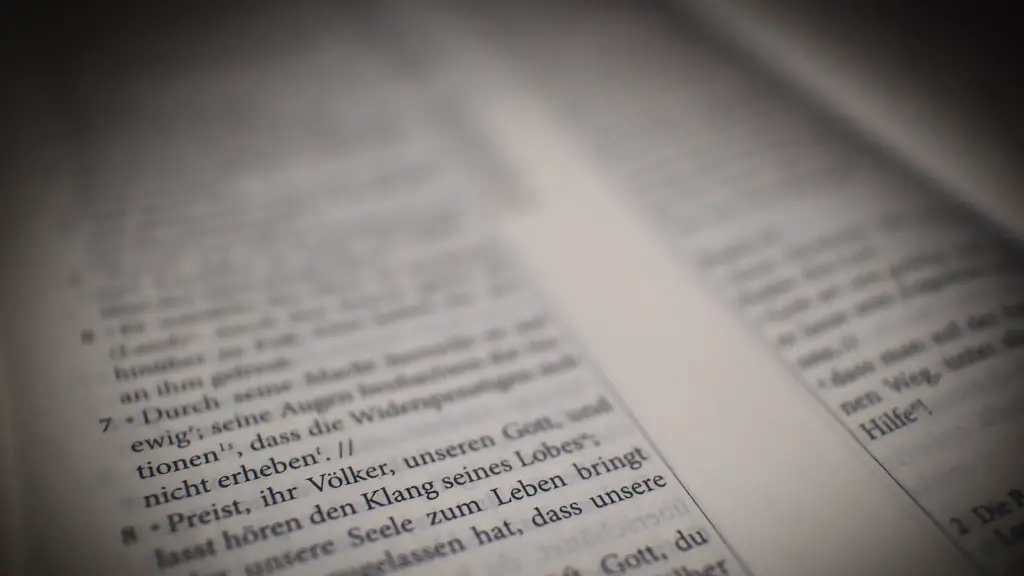Introduction to the Bible’s Perspective on Cremation
The Bible contains no explicit prohibition of cremation. However, the Bible does provide us with some information about cremation that we may consider before deciding whether cremation is okay with God. For example, the Bible instructs us in Deuteronomy 21:23 that a body should not be burned and we also read in Joshua 7:15 that, when the body of Achan had been burned, God was displeased. In Leviticus 20:14, we read that anyone who burns the body of a person who has been cursed should be put to death. Furthermore, in 2 Samuel 21:1-14 and 2 Kings 23:20-25, we read that the bodies of criminals were burned, as a sign of God’s judgment. So, we may conclude that although cremation is not explicitly prohibited by the Bible, there are some passages which suggest that it carries a certain stigma.
Cremation in Ancient Times
In ancient times, before the time of Christ, burial was the usual way to dispose of the dead. This has even been pictured in the Bible in 1 Kings 13:30 and 2 Kings 23:16-17, in which burial sites was discovered. In Job 3:14-15, Job asks God why he was not stillborn so that he would not have to experience life and then die, and would not need a tomb.
Further, the Talmud (the traditional Jewish legal document) states that those who were cremated instead of buried were denied a proper burial in the afterlife and were not allowed to join the other Jews in the world of the dead. That being said, while cremation was uncommon in ancient times, there are some references in the Bible that indicate that it was practiced, such as in Ezekiel 32:27 and Amos 6:10, both of which speak of burning the bodies of the dead.
Cremation During Biblical Times
Although ancient Jewish beliefs surrounding cremation and burial were carefully followed, during the time of the New Testament and during the early church, this became more relaxed. During this time, the practice of cremation began to be accepted, due to the cultural and religious acceptance of other funeral practices and beliefs.
For example, cremation was already an established practice in Greece before the time of Jesus and it was thought to be a more delicate and respectful way of disposing of the dead. Furthermore, it was believed to be cheaper than burying a body. Cremation was also accepted by the Druids and was the main funeral practice of the Viking and Saxon peoples.
Cremation in Recent Times
Today, cremation is much more common than burial, due to it being more convenient, less expensive and also more appealing to people’s environmental views. According to the Cremation Association of North America, the cremation rate in the United States is currently around 55%.
Due to its increasing popularity, many people have considered whether this practice is permissible in light of the Bible. The main argument from Christian believers against the practice of cremation is the potential for the desecration of the body. Since the body of a Christian is considered to be the temple of the Holy Spirit, some believers feel that it should be treated with respect and dignity and not destroyed through cremation.
Modern Scholars’ Perspectives
Despite the historical evidence that cremation was not often practiced in Biblical times, modern scholars contend that there is no Biblical reason to prohibit or condemn the practice of cremation. In fact, many even go so far as to argue that cremation is actually a Biblically sanctioned practice, if the right conditions are met and the person’s values and beliefs align with it. For example, in the book “Theology of the Body and Cremation: A Catholic Perspective”, author Pauline Kidner argues that if cremation is done in an ethical and respectful way, it is not a sin.
Analysis and Insights
Overall, although the Bible does not explicitly state that cremation is unacceptable, there are some passages and cultural norms present during Biblical times which may indicate a certain stigma towards cremation. That being said, modern thinkers may believe that if done respectfully and ethically, cremation is a Biblically sanctioned practice.
Theology and Cremation
Theology has a major role to play in the practice of cremation. Throughout history, theologians have debated the rights and wrongs behind cremation practices, often bringing up biblical passages as part of the discussion. Although the Bible does not explicitly condemn or condone cremation, these passages may provide an indication of God’s view on the matter.
For example, some emphasize passages in the Bible that might act as prohibitions on cremation. These include Deuteronomy 21:23, which states that a body should not be burned, and Leviticus 20:14, which mentions that anyone who burns the body of a cursed individual should be put to death. Conversely, there are also passages which may indicate God’s permission or even approval of cremation, such as Joshua 7:15, in which God is not pleased when Achan’s body is burned, but He does not punish anyone for doing so.
Modern Views
Modern views on cremation tend to be much more relaxed than traditional theological views. This can be attributed to the rise of secularism, the acceptance of different religious practices, and the desacralization of the body. In addition, the increasing cost of burial, which has made it an unattractive option for many, has also spurred on the popularity of cremation.
Furthermore, cremation is increasingly viewed as a sign of environmental consciousness. Cremation uses significantly less land than burial and produces no toxic chemicals, making it a more eco-friendly option when it comes to disposing of the dead.
Philosophical Perspectives
The philosophical implications of cremation must also be taken into consideration when discussing this practice. Cremation is often viewed as a way of returning the deceased to the earth from whence they came, with its roots in pagan beliefs. Moreover, some see it as an act of surrender, as the deceased are no longer controlling the destiny of their body.
Furthermore, it may also be argued that cremation can lend a measure of closure to those grieving a loss. In the literal sense of the word, it symbolizes the ending of life and the transition from physical to spiritual existence. It is also seen as a way to acknowledge that life is finite, and to honor the loved one by reducing their body to ashes.
The Meaning of Cremation
The meaning of cremation is highly subjective and dependent on the individual’s values and beliefs. There is no one definitive answer to the question of whether cremation is Biblically acceptable, as interpretations may differ depending on the individual and their personal and religious views.
That being said, it can generally be concluded that cremation is an acceptable practice according to the Bible, providing it is conducted with respect and dignity and aligns with the person’s beliefs and values. In the end, the important thing is not to focus on the physical death, but rather to reflect on the life that was lived and to honor the memory of the deceased.


